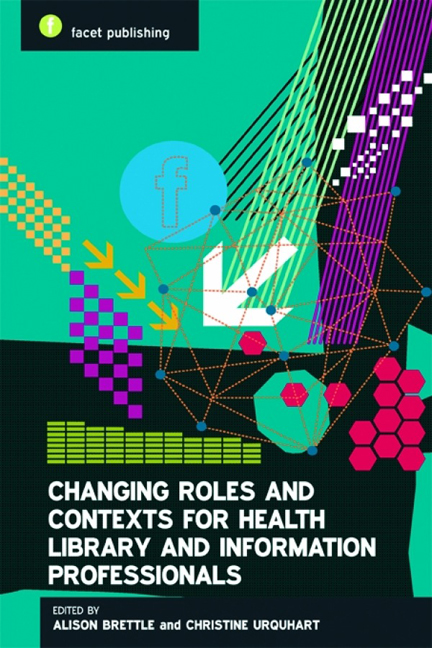Book contents
- Frontmatter
- Contents
- About the editors
- List of contributors
- Overview
- Part 1 Context
- Part 2 Roles
- 5 Skills, competencies and knowledge
- 6 The librarian as information provider and educator
- 7 The librarian who analyses information and manages knowledge
- 8 The librarian within research and evidence-based practice
- 9 The librarian as decision maker
- Conclusion
- Index
6 - The librarian as information provider and educator
from Part 2 - Roles
Published online by Cambridge University Press: 08 June 2018
- Frontmatter
- Contents
- About the editors
- List of contributors
- Overview
- Part 1 Context
- Part 2 Roles
- 5 Skills, competencies and knowledge
- 6 The librarian as information provider and educator
- 7 The librarian who analyses information and manages knowledge
- 8 The librarian within research and evidence-based practice
- 9 The librarian as decision maker
- Conclusion
- Index
Summary
Introduction
This chapter describes the health librarian in the role of information provider and educator. By way of introduction, Pat Spoor and Debra Thornton describe this role from both higher education and NHS library perspectives. Four case studies in four different contexts follow to illustrate different aspects of these roles in practice.
HIGHER EDUCATION OVERVIEW
Pat Spoor
Introduction
Health librarians, in a university context, are the academic liaison librarians who work closely with departments to develop and manage access to information, deliver academic skills training, support research and ensure that the university library is aware of, and responsive to, the needs of different disciplines. Information provision is one of their core functions but the range and complexity of resources and providers means that they depend increasingly on input from colleagues in e-resources, acquisitions, cataloguing, IT and customer services to provide the complex network of resources that library users need and expect. This role is illustrated with a case study by Lorie Kloda later in this chapter.
The role of academic librarians in general has changed significantly in recent years, driven by a combination of educational, political, technological and financial developments. These changes are elaborated below and are relevant for all academic librarians, whatever their subject domain. However, for academic health librarians the growth of evidence-based practice (EBP) and the need to take account of changes in health policy and practice add an extra dimension to their role as they endeavour to meet the information needs of the students, academics and NHS staff who use HE libraries.
Collection development
Traditionally, academic librarians had an in-depth knowledge of subject collections, but this is changing as the concept of collections gives way to one of access. The advent of ‘big deal’ journal packages has hugely expanded the range of journals available to HE. This, and the plethora of subscription and open access e-resources available, has shifted the emphasis for librarians from collection development towards providing seamless access to integrated digital and physical resources. The growth of consortial purchasing, where negotiations with publishers are done via an intermediary, has also changed the nature of the librarians’ relationship with resource provision, though this type of cross-institutional co-operation may diminish with the proposed changes to student fees (Browne, 2010).
- Type
- Chapter
- Information
- Publisher: FacetPrint publication year: 2011



